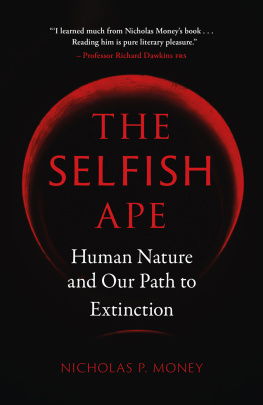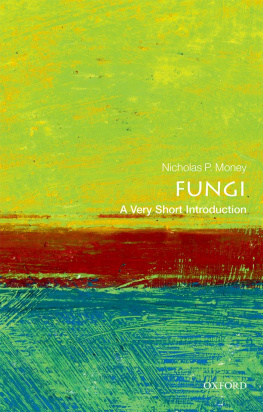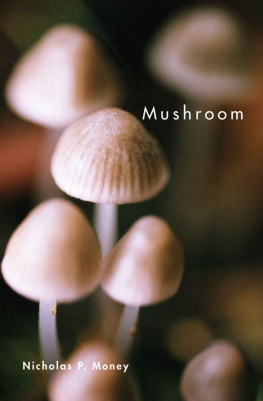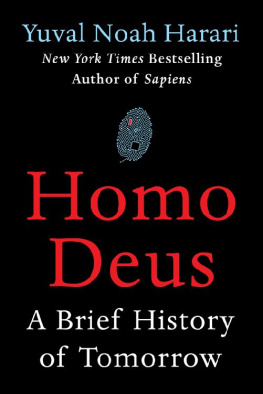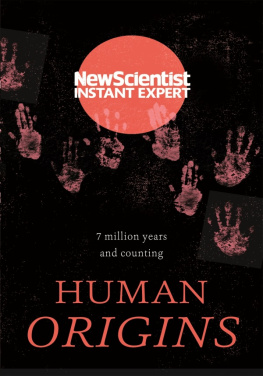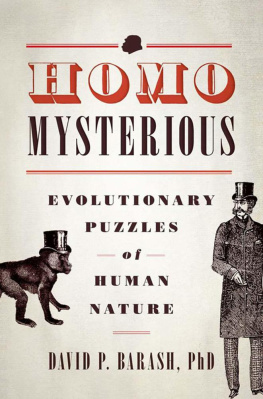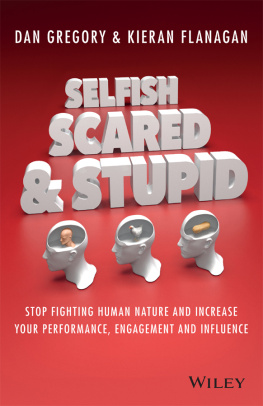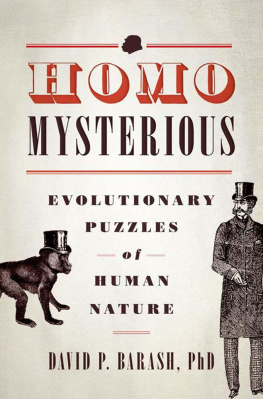THE SELFISH APE

THE
S ELFISH A PE
Human Nature and
Our Path to Extinction
NICHOLAS P. MONEY
REAKTION BOOKS
Published by
REAKTION BOOKS LTD
Unit 32, Waterside
4448 Wharf Road
London N1 7UX, UK
www.reaktionbooks.co.uk
First published 2019
Copyright Nicholas P. Money 2019
All rights reserved
No part of this publication may be reproduced, stored in a retrieval system, or transmitted, in any form or by any means, electronic, mechanical, photocopying, recording or otherwise, without the prior permission of the publishers
Page references in the Index match the printed edition of this book.
Printed and bound in Malta by Gutenberg Press Ltd
A catalogue record for this book is available from the British Library
eISBN 9781789141832
CONTENTS
PREFACE
IS IT, indeed, true, that the Poet, or the Philosopher, or the Artist whose genius is the glory of his age, is degraded from his high estate by the undoubted historical probability, not to say certainty, that he is the descendent of some naked and bestial savage, whose intelligence was just sufficient to make him a little more cunning than the Fox, and by so much more dangerous than the Tiger?
THOMAS HUXLEY, Mans Place in Nature (1863)
T his book is about what we are. Looking in the bathroom mirror in the morning, I have been struck, from time to time, by the foolishness of the animal blinking back at me. When the prospects of the day seem unusually bright, the mirror frames the Laughing Cavalier, but a rather melancholic creature appears more often. Whatever the reflection, the time spent pulling at my skin and putting the fear of imminent demise to sleep for another day suggests some level of vanity. In our age of extreme self-absorption, my case of egotism is comparatively mild, but I did write a song some time ago that argues differently. It is suited for a Victorian music hall and the high-pitched voice of an overly sensitive youth. Here is the first verse:
How cruel is life, to me, today,
That Im not rich and famous?
And I am forced to just scrape by,
And try to be courageous.
But enough about me. All of us belong to a species of African ape to which Carl Linnaeus applied the Latin name Homo sapiens, or wise man, in 1758. He must have felt very confident about our brilliance at that time. Fantastical thinking throughout human history has led us to the strangest delusions about our significance in nature and there is a dreadful persistence to claims that we are better than the rest of the biological world and that we are forging a brighter future through our technological brilliance. According to the view of one popular thinker, we are already assuming the role of a new version of man with godlike powers: Homo deus. With our collective wisdom in such short supply in this twenty-first century, and the international energy invested in navel-gazing, Homo egotisticus seems more appropriate; or, better still, Homo narcissus self-absorbed man.
The outline of the Narcissus myth is probably familiar to readers, but a refresher may be helpful. As the Roman poet Ovid tells it in his Metamorphoses, Narcissus was the beautiful teenage son of a river nymph called Liriope. Girls and boys, as well as spirits of the woods and waters, were captivated by the young man. Narcissus enjoyed the attention, but he spurned every attempt at intimacy. One of the rejected male admirers prayed that Narcissus would be punished with a taste of his own medicine, and this wish was granted in spades by the goddess Nemesis. Seeking a restful spot in the woods, Narcissus became spellbound by his reflection in a pool of clear water. Falling deeply in love, and exasperated that he could not embrace this dazzling young man, he realized after a while that the object of his desire was himself. Rather than bringing him back to his senses, this insight only deepened his desire. Anguished beyond bearing, he willed himself to death.
Before we allow ourselves to feel superior to the poor lad, consider that his triumph of personal absorption over self-preservation applies to humanity today as we demonstrate our inability, or unwillingness, to wrestle with climate change. Ours is an expression of narcissism beyond the dreams of Ovid. We are cosmic vandals. In the eighteenth century, Edward Gibbon wrote with brilliance about The History of the Decline and Fall of the Roman Empire; there will be no historian to write The History of the Decline and Fall of the Earth. Three centuries after Linnaeus, we have all the evidence required for a rechristening:
Homo narcissus: illa simiae species Africana ab origine quae adeo orbem pervastavit terrarum ut ipsa extincta fiat.
Homo narcissus: species of ape of African origin that devastated Earths biosphere and thereby drove its own extinction.
We would be well advised to take a more objective look at ourselves, to appreciate what we are and what we are not. This short book is designed as a recalibration device. We begin with our location in the cosmos ( considers the fate of civilization with the hope that by facing the truth we will transcend our self-absorption and elevate Homo narcissus, providing some redemption and justifying the name Homo sapiens.
With such magnificent brains, it is tempting to believe that even the biggest problems can be fixed, that technology will save us, that Chicken Licken was wrong. P. G. Wodehouse framed the fluffiness of this thinking very gently:
Im not absolutely certain of my facts, but I rather fancy its Shakespeare... who says that its always just when a chappie is feeling particularly top-hole, and more than usually braced with things in general that Fate sneaks up behind him with a bit of lead piping.
The clock is ticking. The Four Horsemen will be here in the blink of a geological eye.
ONE
GLOBE
How Life Lends Itself to Earth
W e spend most of our lives on the surface of the Earth, in contact with the ground and breathing in the atmosphere. We walk, run, sit and sleep on land. We inhale and exhale a mixture of gases from first breath to last gasp. All of our companions, from the largest whales to the smallest viruses, exist in the 20-km-thick (12-mi.) skin of Earths biosphere. High above, in the upper atmosphere, even the most resilient organisms dry out and are burned to crisps by the Sun. Below the biosphere, in the depths of the crust, life is extinguished by heat radiating from the underlying mantle.
Oodles of physical peculiarities support the biological activity here. Earth traces a Goldilocks orbit, at a distance from the Sun which allows water to be liquid: not too close to make it boil away and not too far to make it freeze. The Sun is a medium-sized, middle-aged star, classified as a yellow dwarf by cosmologists. Yellow dwarfs are nuclear reactors that fuse atoms of hydrogen into helium and release a lot of energy. Our star is 4.6 billion years old. It will continue to burn for another 5 billion years before it runs out of its hydrogen fuel and swells into a weaker type of star called a red giant. Long before then, in a billion years or so, the ageing Sun will turn brighter and its awful incandescence will sterilize the biosphere for good.
Without the Sun behaving as it does, and without the galaxy being as old as it is to have formulated the chemical ingredients for building living things, we would not be here. Delving further into the workings of physics and chemistry, some scientists argue that the universe is fine-tuned in a fashion that supports life. The force of gravity is an example of one of these fortunate characteristics. If gravity were slightly weaker, matter would never become compressed into stars in the first place. Conversely, a stronger gravitational force would have prevented the expansion of the universe and ended the festivities in a Big Crunch soon after the Big Bang.

